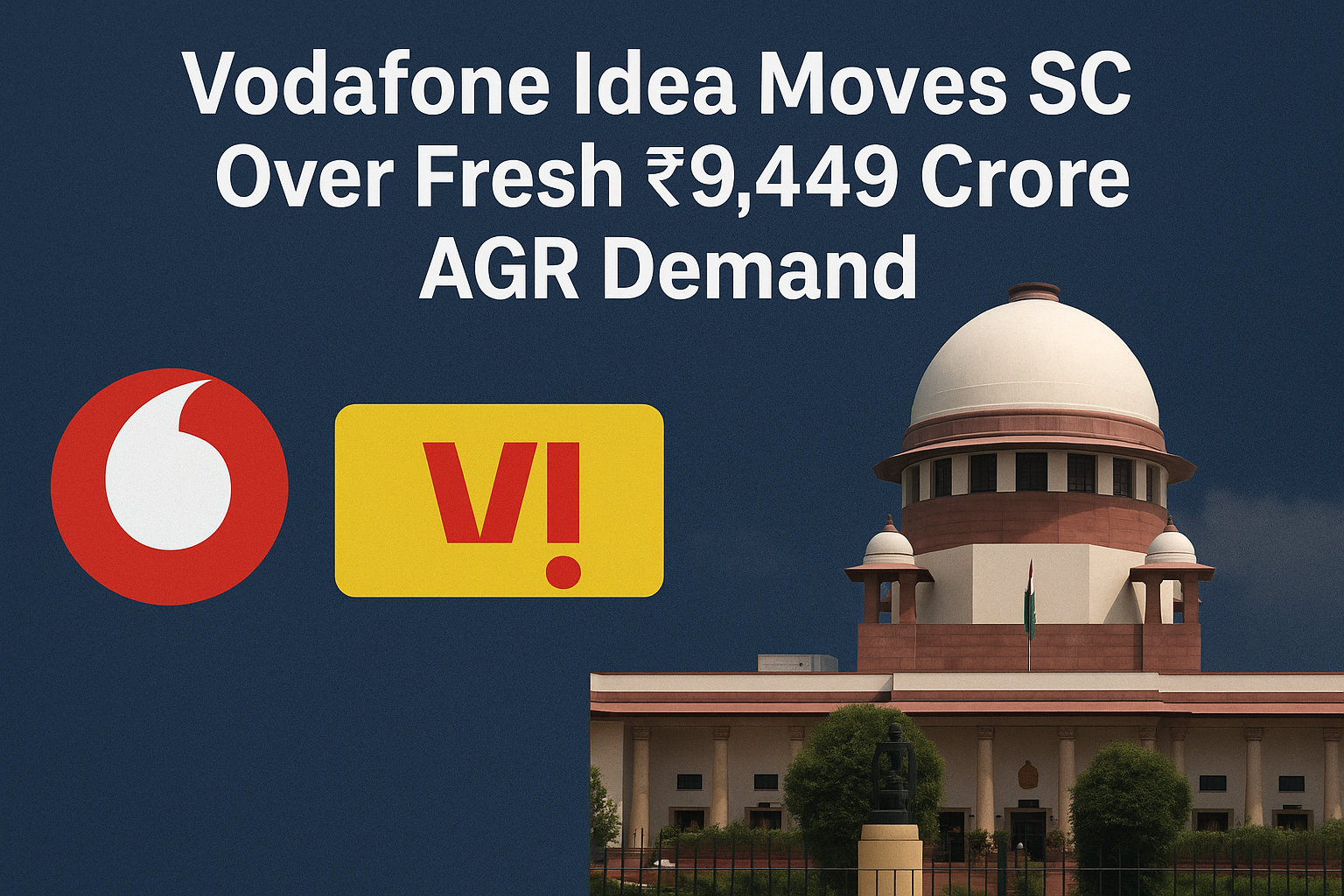Vodafone Idea moves SC over fresh Rs 9,449 crore AGR demand
In a significant development in the long-standing adjusted gross revenue (AGR) dispute, Vodafone Idea (Vi) has approached the Supreme Court of India challenging a fresh demand of ₹9,449 crore raised by the Department of Telecommunications (DoT). The telecom operator, already struggling with high debt and dwindling subscriber numbers, has argued that the demand is inconsistent with the apex court’s earlier orders.
Background: AGR Dues and Supreme Court Rulings
The AGR case has been one of the most crucial financial and legal challenges for India’s telecom sector. In 2019, the Supreme Court upheld DoT’s definition of AGR, which includes both telecom and non-telecom revenues for the purpose of calculating spectrum usage charges and license fees. This ruling left operators like Vodafone Idea and Bharti Airtel with massive outstanding dues.
Vodafone Idea’s total AGR liability was pegged at over ₹58,000 crore, of which the company has already paid around ₹7,800 crore. The rest was allowed to be paid in 10 annual installments ending in 2031.
The Fresh Demand: ₹9,449 Crore
According to the latest reports, DoT has issued an additional demand notice to Vodafone Idea for ₹9,449 crore, citing interest, penalties, and recalculations linked to AGR dues. This has led the operator to seek relief from the Supreme Court, arguing that:
- The fresh demand violates the Supreme Court’s earlier judgment finalizing AGR dues.
- The calculation methodology adopted by DoT lacks transparency.
- The company is already under severe financial stress, and additional liabilities threaten its survival.
Vodafone Idea’s Arguments
Vodafone Idea, in its petition, has highlighted the following key points:
- Finality of AGR dues: The apex court in 2020 made it clear that no reassessment or reopening of AGR dues will be allowed. Hence, any new demand contradicts that order.
- Financial stress: With a debt burden exceeding ₹2 lakh crore, the company argues that imposing fresh liabilities could push it closer to insolvency.
- Investor confidence: The uncertainty around AGR dues hampers the company’s ability to raise fresh capital from investors.
Industry Implications
The AGR case is not just about Vodafone Idea—it has wider implications for the entire telecom sector:
- Survival of Vodafone Idea: Vi plays a crucial role in maintaining a three-player market alongside Reliance Jio and Bharti Airtel. Its collapse could lead to a duopoly, hurting consumer interests and market competition.
- Investor sentiment: Fresh demands raise concerns about policy stability in India’s telecom sector, potentially discouraging foreign investments.
- Digital India push: A financially healthy telecom industry is critical for the government’s goals of expanding digital connectivity and 5G services.
Government’s Stand
The Department of Telecommunications maintains that it has the right to recover all dues under the AGR ruling. Officials argue that the demand has been calculated in line with the court’s order and applicable regulations. However, the matter is now sub-judice, and the Supreme Court’s response will be pivotal in shaping the future of Vodafone Idea.
What Lies Ahead
The Supreme Court’s decision will determine whether the ₹9,449 crore demand stands or is quashed. For Vodafone Idea, a favorable judgment would provide much-needed relief as it seeks to raise funds, invest in network expansion, and roll out 5G services. On the other hand, an adverse ruling could severely limit its chances of revival.
Vodafone Idea’s move to the Supreme Court over the fresh AGR demand of ₹9,449 crore underscores the continuing financial and regulatory challenges faced by the telecom sector in India. With the future of one of India’s largest telecom operators at stake, the upcoming court hearings will be closely watched by stakeholders across the industry.






Knowledgeable
kya bol rahi ha aap